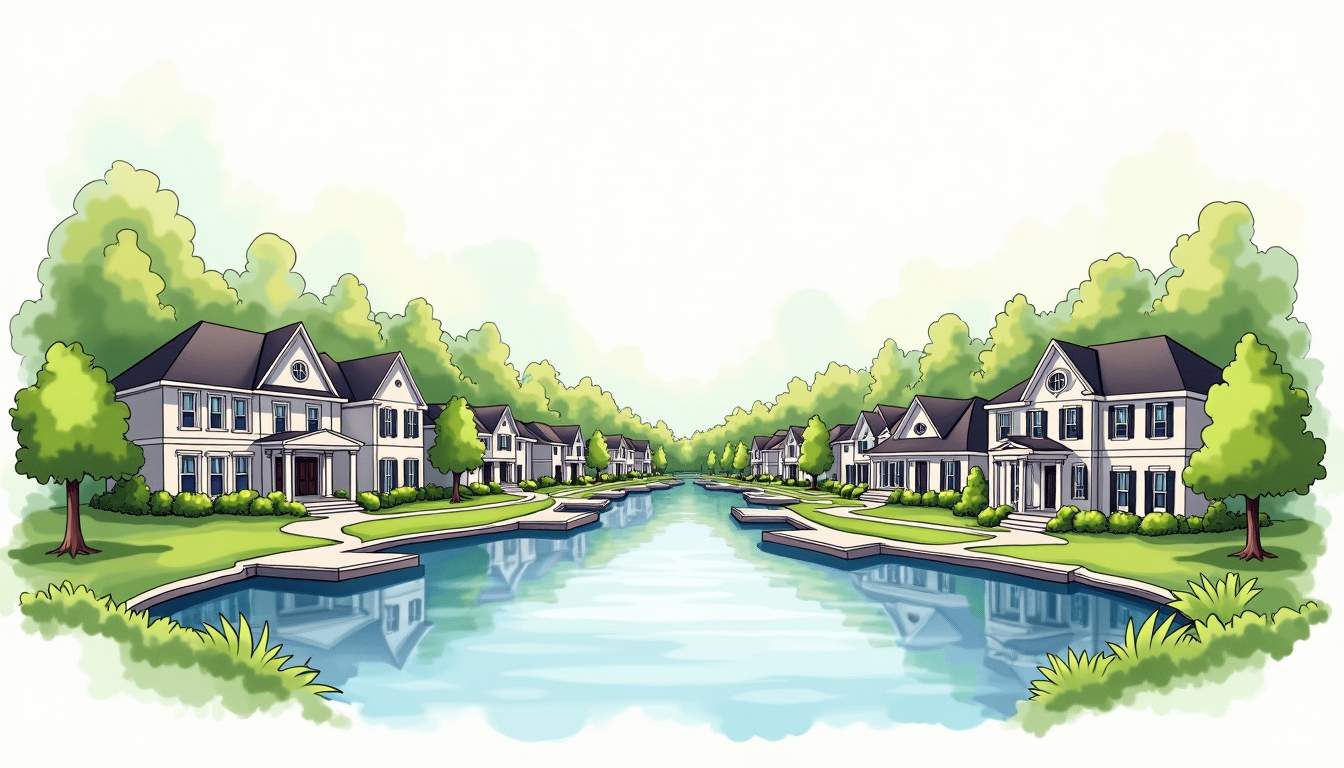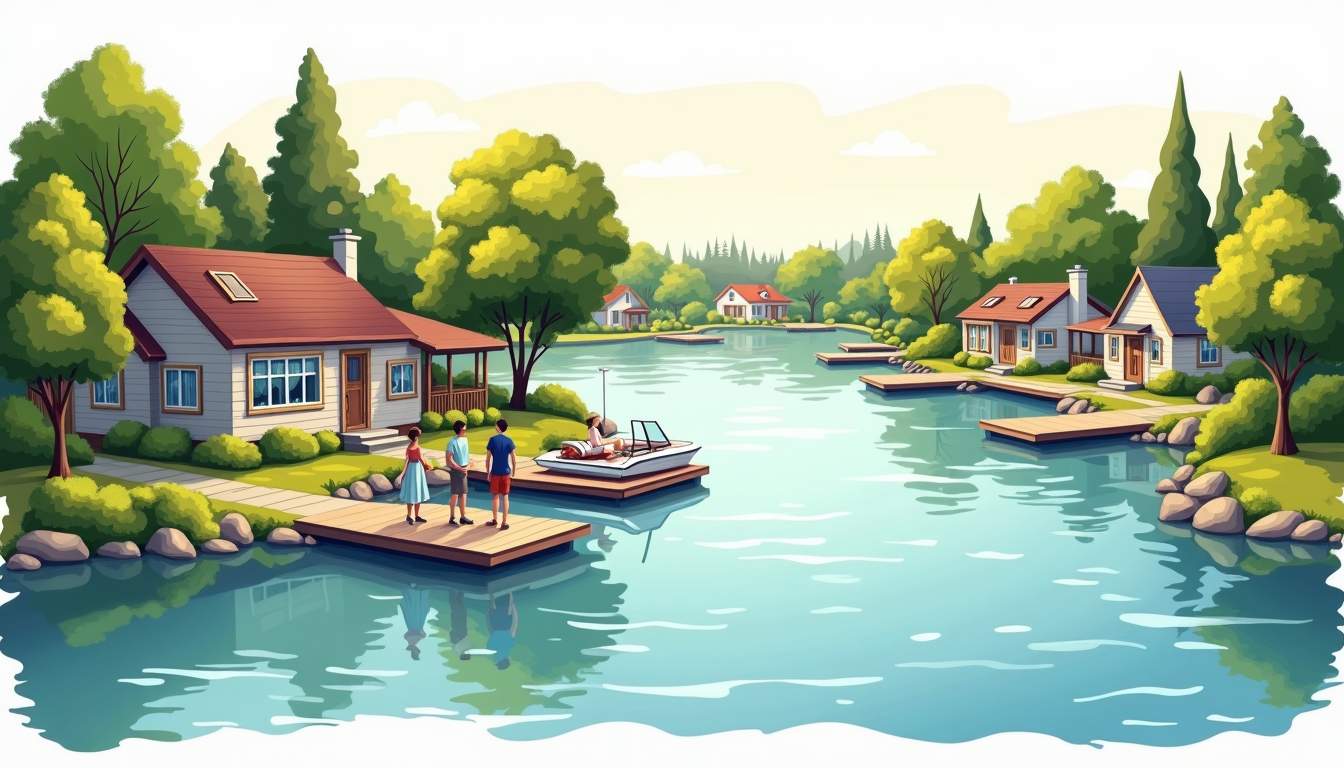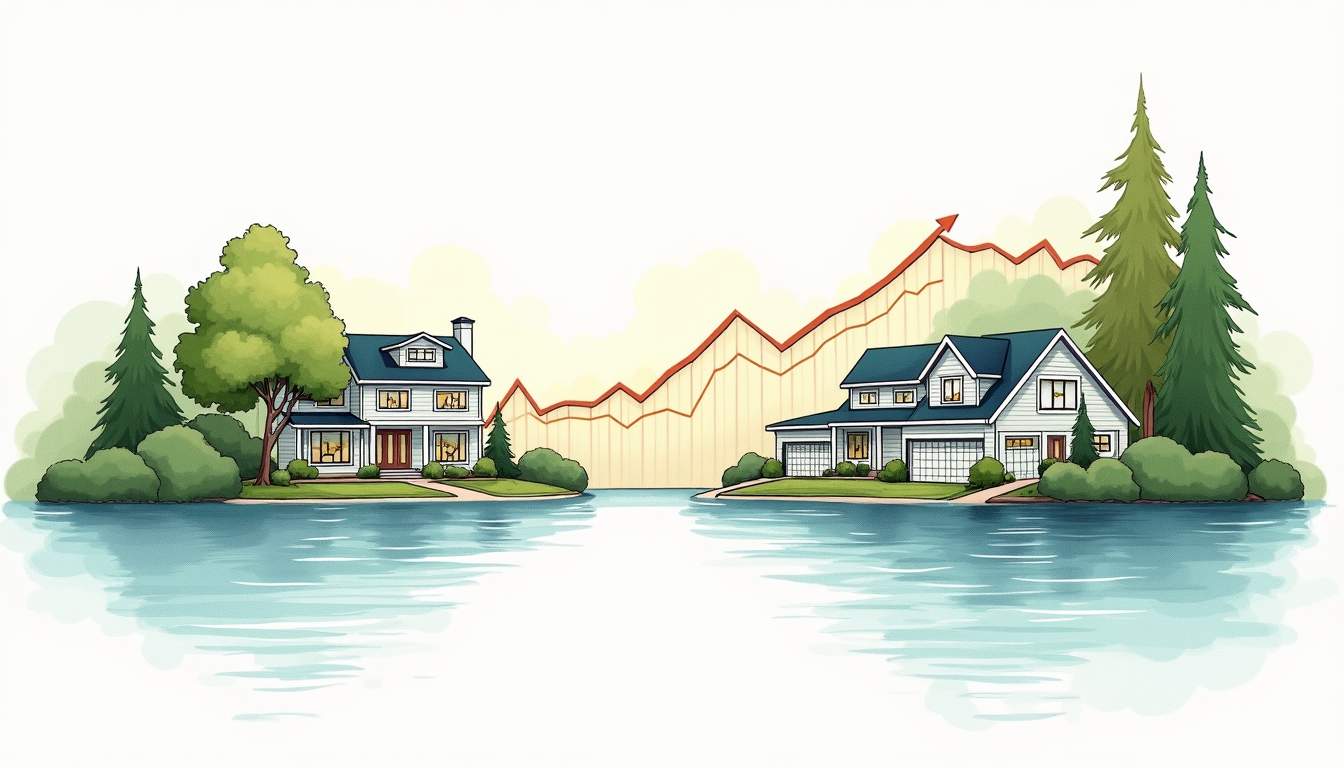
Watts Bar Lake, straddling parts of Roane, Rhea, Meigs, and Loudon counties in Tennessee, draws buyers seeking waterfront serenity and recreational access without sacrificing community amenities. Private neighborhoods around the lake range from small, gated enclaves with private docks to larger planned communities that offer roads, shared green spaces, and social clubs. This guide covers what buyers need to know when considering private residential options on or near Watts Bar Lake, from evaluating waterfront infrastructure to understanding local regulations, financing, and long-term maintenance responsibilities.
Private neighborhoods offer a mix of seclusion and shared responsibility. Access to common docks, private roads, and neighborhood security can make life easier for property owners while preserving property values. For many buyers, the appeal is the managed shoreline access and a reduced number of transient visitors compared to public boat ramps and day-use areas.
Beyond privacy, these neighborhoods often include planning controls—covenants, conditions, and restrictions (CC&Rs)—that maintain aesthetic standards and limit incompatible uses. That oversight can protect the community’s character and help ensure that waterfront views and access stay attractive for years to come.
Moreover, living in a private neighborhood on Watts Bar Lake means joining a community with shared interests in lake preservation and recreational activities. Many neighborhoods organize social events, boating clubs, and conservation initiatives that foster a sense of camaraderie among residents. This communal spirit enhances the overall living experience, making it more enjoyable and meaningful.
Additionally, private neighborhoods tend to have well-maintained infrastructure, including paved roads, lighting, and available utilities, which can significantly enhance convenience and safety. This level of upkeep not only benefits daily living but also supports long-term property value growth. For those who prioritize a blend of natural beauty and modern amenities, private neighborhoods on Watts Bar offer an ideal setting.
Smaller neighborhoods near Watts Bar Lake commonly organize as homeowner associations or dock cooperatives. These setups typically manage a handful of shared docks and a small stretch of shoreline. Fees tend to be modest, and decision-making is often informal. These communities are ideal for buyers who want waterfront access without the administrative complexity and higher fees of large resort-style developments.

In these small associations, social cohesion is often a strong feature, with neighbors knowing one another and collaborating on upkeep and community events. Dock co-ops especially encourage a sense of shared stewardship over the lakefront amenities, with cooperative schedules for dock use and communal efforts for maintenance and improvements. This model provides a balanced blend of independence and community support that appeals to many buyers valuing intimacy and simplicity.
Larger private developments may include gated entry, private roads, landscaped common areas, and amenities such as boat slips, clubhouses, and walking trails. These communities attract buyers seeking a resort-like experience with higher levels of service and maintenance. HOA dues are higher, but they often cover road maintenance, landscaping, and dock upkeep—services that would otherwise fall to individual owners.
Many gated communities also offer enhanced security features, including surveillance cameras and security patrols, contributing to peace of mind for residents. Additionally, they may host organized social and recreational activities, fostering an engaging community atmosphere. Buyers in these neighborhoods can often expect carefully curated landscapes and strict architectural guidelines, ensuring a consistent aesthetic and protecting property values over time.
In more rural portions around the lake, shared easements can grant a handful of property owners access to a private stretch of shoreline. These arrangements require careful review of legal documents to confirm access rights, maintenance responsibilities, and any limitations on building docks or modifying the shoreline. These parcels appeal to buyers who want greater acreage or a more rustic setting while retaining some communal lake access.
This type of ownership often provides ample privacy and a connection to nature that is harder to find in more densely developed areas. However, residents should be prepared for potential responsibilities such as coordinating maintenance and addressing issues like shoreline erosion or access disputes with fellow easement holders. The balance of solitude and shared access makes these parcels attractive to those desiring a quieter, more self-reliant lifestyle near the lake.
Confirm whether the property includes private dock rights, the number and size of permitted slips, and whether docks are maintained by the HOA or individual owners. Some neighborhoods have waitlists for slips or restrictions on dock construction; others limit power or winterization options. Dock permits from the Tennessee Valley Authority (TVA) or local counties may be required, and permit status should be verified to avoid retroactive compliance costs.
Shoreline stabilization and erosion control are major considerations on Watts Bar Lake. Slope stability, riprap requirements, and tree removal restrictions are commonly regulated at county and TVA levels. Buyers should obtain recent shoreline surveys and ask about any neighborhood-wide mitigation plans or special assessments tied to erosion control projects.
Examine CC&Rs for lot-use restrictions, building setbacks, roof materials, exterior colors, and rules regarding short-term rentals. Architectural review boards in private neighborhoods often require pre-approval for additions, docks, and other exterior changes. A clear understanding of these constraints helps avoid surprises during renovation or expansion plans.
Title searches should reveal any easements, covenants, or shared usage agreements that affect the property. Confirm the legal status of private roads—who maintains them and whether the road is subject to future public takeover. Easements for utilities and neighbor access can also affect privacy and development options.
Many private lake neighborhoods rely on septic systems and private wells. Have septic systems inspected and obtain records of pumping or repairs. Water quality testing for private wells is essential, along with confirmation of any shared wastewater systems. For properties connected to public water or sewer, verify service availability and capacity.
Homes near water face unique maintenance issues: elevated humidity, mold risk, and potential foundation movement. Hire inspectors familiar with waterfront properties to evaluate structural integrity, roofing, HVAC, and potential flood impacts. Environmental assessments may be needed if there’s a history of shoreline modifications or nearby industrial use.
Financing a home in a private lakeside neighborhood can differ from standard home loans. Lenders will assess the property’s access to public roads, the status of HOA dues, and any rental restrictions that could affect income potential. Waterfront lots without immediate road access or with unique easements may require specialty lending or higher down payments. It helps to consult lenders experienced with lake properties to understand available mortgage products and insurance requirements.
Flood insurance may be recommended even if a property is outside a mapped floodplain. Insurers consider wave action, shoreline erosion, and previous flood history. For homes with private docks, separate marine or boat insurance might be necessary. Review insurance quotes early in the buying process to estimate ongoing costs accurately.
Community life varies widely. Some neighborhoods host seasonal events, fishing tournaments, and shared maintenance projects. Others prioritize quiet, offering informal social opportunities like neighborly dock nights or walking groups. Prospective buyers should attend community meetings when possible and talk with several residents to gauge responsiveness of boards and the spirit of cooperation within the neighborhood.

Consider practical lifestyle factors: winter access to private roads, snow removal, and how seasonal water level changes affect boat access and dock usability. Local services such as trash pickup, internet reliability, and proximity to groceries, healthcare, and schools influence daily living—especially for buyers relocating full-time.
Private neighborhoods with strong governance, well-maintained shared amenities, and consistent enforcement of aesthetic standards typically maintain higher resale values. Waterfront properties generally appreciate well, but local market trends, lake water quality, and access rules can influence demand. Track recent sales within the neighborhood and comparable nearby communities to build realistic expectations for appreciation and rental potential.

Negotiate contingencies for dock inspections, confirmation of HOA financials, and any outstanding special assessments. Request copies of recent minutes from HOA meetings to identify potential upcoming projects or disputes. Confirm how reserves are managed—adequate reserves reduce the risk of surprise assessments for large repairs like dock replacement or road resurfacing.
During closing, ensure all required permits for docks, shoreline work, and road access are in place. Transfer documentation for dock slips and common area rights should be clear. Verify any rental restrictions if short-term rental income is part of the purchase rationale, and confirm whether the HOA collects occupancy taxes or has separate registration rules for renters.
Engage real estate agents familiar with Watts Bar Lake and its private neighborhoods. Agents who specialize in waterfront property understand the nuances of dock permits, flood zones, and HOA dynamics. Similarly, local attorneys can review covenants and easements thoroughly, and surveyors experienced with waterfront lots can map shoreline boundaries and identify encroachments.
Contractors with experience in dock construction, riprap installation, and waterfront foundation work provide realistic cost estimates for maintenance and upgrades. Insurance brokers and lenders with waterfront portfolios offer tailored policies and financing terms that reflect the unique risks and values of lake properties.
Private neighborhoods around Watts Bar Lake offer a compelling blend of recreation, community, and managed waterfront access. Buyers who do thorough due diligence—examining legal documents, assessing shoreline conditions, and reviewing HOA financials—are better positioned to choose properties that fit both lifestyle and financial goals. With proper planning and the right local expertise, a home in a private lakeside neighborhood can deliver years of enjoyment and steady investment value.
For anyone considering a purchase, the recommended next steps include arranging neighborhood visits during different seasons, talking with current residents, and assembling a team of local professionals to guide inspections, permitting, and negotiations. These actions help ensure the selected property meets expectations for access, maintenance, and long-term livability on Watts Bar Lake.
After exploring private neighborhoods around Watts Bar Lake, elevate your lifestyle at Tennessee National—a premier gated community where waterfront access meets luxury amenities. Enjoy a Greg Norman Signature Golf Course, private marina, waterfront dining, and over 20 exclusive member amenities set amidst Tennessee’s stunning natural beauty. Whether you seek a move-in ready home or a custom build, Tennessee National offers the perfect blend of resort-style living and lakeside tranquility. Schedule a Private Tour today and begin creating unforgettable memories in your ideal lakeside community.